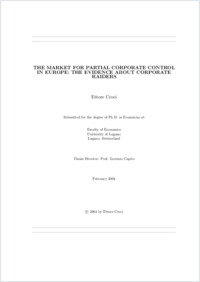The market for partial corporate control in Europe : the evidence about corporate raiders
- Croci, Ettore
- Caprio, Lorenzo (Degree supervisor)
-
19.02.2004
183 p
Thèse de doctorat: Università della Svizzera italiana, 2004 (jury note: Magna cum laude)
English
Corporate raiders are often associated with the 1980s takeover wave that reshaped the U.S. corporate landscape. While during the 1980s Europe remained relatively immune to this sort of investor, corporate raiders have operated actively both in Continental Europe and in the U.K. since the mid-1990s. Yet these corporate raiders are very different from the raiders that operated in the U.S. market during the 1980s. Whatever the perspective adopted, even the 1990s European corporate raiders are a controversial group of investors. Their purchases were usually accompanied by a lot of rumors and speculations. The financial press sometimes described them as investors who were interested only in short-term profits. On the other hand, raiders were also praised as corporate governance champions who shook up European boardrooms as never before. Corporate raiders were key players in redefining corporate Europe during the 1990s.Thus, first, it is natural to wonder whether these investors helped to improve the performance of their target firms or whether they simply extracted corporate resources to their advantage from these companies. Second, the investors who are labelled corporate raiders are generally believed to have superior skills in spotting profitable investments. Finally, these raiders earned a reputation as troublemakers. As far as I know, this dissertation is the first attempt to examine the behavior of the particular investors called corporate raiders. This dissertation belongs to the growing body of literature exploring the market for partial corporate control in Europe. The contribution of the thesis is twofold. First, it provides new evidence concerning partial corporate control events in Europe. Second, it sheds some light on the question whether the investor's identity matters. I collected both short-run and long-run evidence relating to the firms in which the raiders announced their stockholding. On average, there is a positive market reaction to the first public announcement of stockholding of these investors in a company. Raiders earn an abnormal profit when they sell their stakes within one year of the initial purchase. Conversely, when raiders are still shareholders in a company on 31December 2001 abnormal returns are significantly negative. There is no clear support for the hypothesis that raiders affect firm performances at accounting level. The Holderness and Sheehan (1985) hypotheses are not supported by the evidence. Evidence at individual investor level is provided as well.
- Language
-
- English
- Classification
- Religion, theology
- License
-
License undefined
- Identifiers
-
- RERO DOC 4156
- URN urn:nbn:ch:rero-006-108692
- ARK ark:/12658/srd1317949
- Persistent URL
- https://n2t.net/ark:/12658/srd1317949
Statistics
Document views: 366
File downloads:
- Texte intégral: 446
